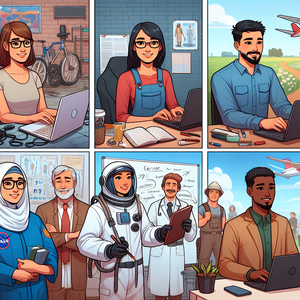The Intersection of Technology and IP Law: Emerging Trends to Watch

Artificial intelligence is revolutionizing industries by automating processes and enhancing decision-making. However, this technology also raises complex questions regarding IP rights. For instance, who owns the IP created by an AI? Is it the developer, the user, or the AI itself? Recent court cases have started to address these questions, leading to a growing need for legal clarity in the realm of AI-generated inventions. A notable example is the case of "DABUS," an AI system that generated patentable inventions without human intervention. The legal battles surrounding DABUS have highlighted the challenges and potential need for new legislation to define ownership and rights in an AI-driven world, prompting IP professionals to adapt to these novel circumstances. As courts grapple with these issues, the outcomes will likely shape the future of IP law, requiring legal experts to remain vigilant and informed.
Blockchain Technology
Blockchain technology is not just limited to cryptocurrencies; it is also making waves in IP law. The immutable nature of blockchain allows for secure and transparent tracking of IP rights, which can be particularly beneficial for creators and innovators. For instance, artists can use blockchain to register their works, ensuring proof of ownership and the ability to enforce their rights more effectively. Smart contracts, a feature of blockchain, are also paving the way for more streamlined licensing agreements. These self-executing contracts can automate the licensing process, ensuring that creators receive payments in real-time when their work is used. This innovation could significantly reduce disputes over IP rights and provide a more equitable revenue stream for creators. For example, musicians can use blockchain platforms like Audius to distribute their music directly to fans, while ensuring that they are compensated fairly.
The Internet of Things (IoT)
The rise of IoT devices introduces new challenges and opportunities for IP management. With billions of devices interconnected, the potential for IP infringement increases. Companies must navigate the complexities of protecting their innovations while ensuring compliance with existing IP laws. Moreover, IoT devices often collect vast amounts of data, leading to questions about data ownership and privacy. For example, if a smart home device generates user behavior data, who owns that data, and how can it be protected? IP professionals must be equipped with the knowledge to address these issues, ensuring that their clients' innovations are safeguarded in the IoT landscape. The challenge lies in balancing innovation with the protection of user data, which has become a critical concern in today's digital age.
Skills Needed for the Future of IP Professionals
To thrive in this evolving environment, IP professionals must develop a diverse skill set. Here are some essential skills for navigating the intersection of technology and IP law: - **Technical Knowledge**: Understanding technological advancements is crucial. IP professionals should familiarize themselves with AI, blockchain, and IoT to provide informed legal advice. This knowledge will enable them to navigate complex legal landscapes and anticipate potential IP challenges. - **Adaptability**: The rapid pace of technological change requires IP managers and attorneys to be adaptable and open to continuous learning. Staying updated on legal precedents and emerging technologies is vital for effective practice. Adaptability also involves being proactive in seeking out new educational opportunities, whether through formal training or self-directed learning. - **Interdisciplinary Collaboration**: As technology intersects with various fields, IP professionals must collaborate with engineers, developers, and business leaders. Effective communication skills will be essential in bridging the gap between technical and legal aspects. Building strong relationships with stakeholders across disciplines will enhance the decision-making process and help to develop comprehensive IP strategies.
The intersection of technology and IP law is an exciting yet complex arena that presents both challenges and opportunities. As advancements like AI, blockchain, and IoT reshape the landscape, IP professionals must evolve alongside these changes to protect innovations effectively. By embracing new technologies, developing essential skills, and staying informed about emerging trends, they can navigate this dynamic field and help businesses maximize their intellectual property assets. Ultimately, the future of IP law lies in the hands of those willing to adapt and innovate in response to the ongoing technological revolution. As we move forward, the integration of technology in IP practice will not only redefine legal frameworks but also create new pathways for creativity and innovation.
Intellectual Property Attorney Specializing in AI and Machine Learning
Law firms specializing in technology, corporate legal departments in tech companies, and government agencies
Core Responsibilities
Advise clients on IP rights related to AI-generated inventions and navigate legal complexities surrounding ownership.
Draft and file patent applications for AI technologies, ensuring compliance with evolving regulations.
Represent clients in disputes or litigation regarding AI-related IP rights.
Required Skills
Strong understanding of both IP law and AI technology; familiarity with cases like DABUS is beneficial.
Excellent research and analytical skills to interpret and apply complex legal frameworks.
Effective communication skills to explain technical concepts to non-legal stakeholders.
Blockchain Compliance Consultant
Fintech companies, legal firms with a focus on technology, and blockchain startups
Core Responsibilities
Ensure that blockchain-based projects comply with existing IP laws and regulations.
Advise clients on the use of smart contracts and their implications for licensing and ownership rights.
Conduct audits of blockchain systems to verify proper IP registration and usage.
Required Skills
In-depth knowledge of blockchain technology and its applications in IP law.
Strong background in regulatory compliance and risk management.
Ability to communicate complex concepts clearly to clients and stakeholders.
IP Data Privacy Specialist
Tech companies, IoT manufacturers, and legal consultancies focusing on data privacy
Core Responsibilities
Analyze data ownership issues related to IoT devices, advising clients on compliance with data protection laws.
Develop strategies to protect user data while maximizing IP rights for IoT innovations.
Work with engineering teams to ensure that products meet legal and regulatory standards for data privacy.
Required Skills
Knowledge of data privacy laws (e.g., GDPR, CCPA) and their implications for IP rights.
Familiarity with IoT technologies and the unique challenges they present for data management.
Strong problem-solving skills and the ability to work collaboratively with technical teams.
Technology Licensing Manager
Corporations with robust R&D departments, technology transfer offices in universities, and licensing agencies
Core Responsibilities
Manage the licensing and commercialization of technology innovations, including AI and blockchain applications.
Negotiate licensing agreements and ensure compliance with IP laws and regulations.
Collaborate with R&D teams to identify patentable innovations and optimize licensing strategies.
Required Skills
Strong negotiation skills and experience in drafting technology licensing agreements.
Understanding of patent law and the technology landscape, particularly in AI and blockchain.
Ability to analyze market trends to inform licensing strategies.
IP Strategy Consultant for Emerging Technologies
Consulting firms, IP advisory services, and corporate strategy teams in tech firms
Core Responsibilities
Develop IP strategies for companies leveraging emerging technologies, ensuring alignment with business goals.
Conduct IP audits and assessments to identify vulnerabilities and opportunities within the innovation portfolio.
Provide guidance on navigating the complexities of IP law in the context of AI, blockchain, and IoT.
Required Skills
Extensive knowledge of IP law, particularly as it pertains to technology sectors.
Strong analytical skills to assess IP portfolios and recommend actionable strategies.
Experience in cross-functional collaboration, working with legal, technical, and business teams.


